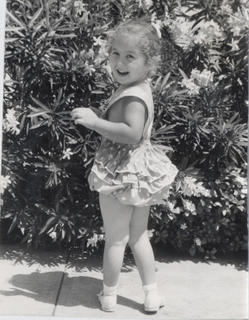Saturday, July 29, 2006
Twenty-Five Years Ago Today...

...my mother, my ex and I were in the midst of a trip to Montreal. Delighted enough with the European ambiance, we'd even unearthed a Hungarian bookstore, where Panni had promptly engaged in a heated argument with the proprietor in their special "language of the moon." I couldn't stop talking about the Royal Wedding--hadn't, in fact, since the engagement in February. Like a drill sergeant, I made us all get up at five o'clock so we could watch the live broadcast. The BBC coverage seemed to be both reverential and subdued (though we kept sneaking peeks at the Buffalo stations). The whole world giggled at her girlish tumble through her vows. I loved the carriage rides; the royal waves...and, of course, the kiss. How daring, we all thought.
So much has changed twenty-five years later. I just wanted to remember a special moment that will forever be frozen in time, that's all.
Thursday, July 27, 2006
Sushi

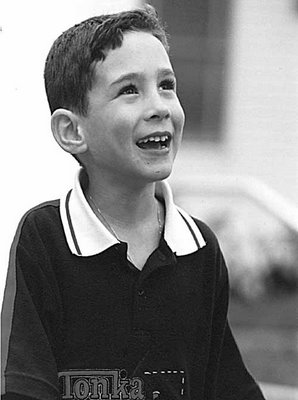

What do salmon sushi, Elian Gonzalez, and the Hungarian flag have in common?
SUSHI
BY GEORGINA MARRERO
Under The Tuscan Sun had just arrived at the theaters. Already knowing I’d love it, I headed toward Sunset Place, parked, and looked around for a place to eat.
I hadn’t eaten all day. As I love sushi, I went to the Sushi Maki across the street. Alas, about an hour earlier, the entire block had lost its electricity.
The young waiter must have thought I was one of those personal injury lawyers who advertise on television, for I proceeded to grill him relentlessly about the sushi: could it possibly still be fresh? It was on ice, he said. “Are you sure?” I asked him again.
I had good reason to be concerned. In April of 2000, while I was still living in my parents’ Miami Lakes house, I had made sushi out of a salmon fish head. Tired of eating out, I had decided to try to prepare a fish soup on my mother’s one good remaining burner. I cut a few slices of salmon off the head, and proceeded to consume them, sushi-style. Plopping the rest of the fish head in a pot, I covered it with water, sprinkled paprika over the concoction, and simmered it for a while. When I deemed it to be ready, I sat down to savor my creation. Delicious! It was eight p.m.
By midnight, I realized that something was wrong. I began to get horrible cramps. What happened next was… well, pretty bad. Let’s just say that I began to shrink before my very eyes. I began to see red. Needless to say, I couldn’t sleep. By five-thirty in the morning, I knew I needed help. Dragging myself to my car, I drove myself to the Palmetto General Hospital.
The Emergency Room was quite crowded. Although I had been granted a stay of execution during the drive, the ink wasn’t yet dry. I had to run to the bathroom several times before I managed to stagger to the admitting desk.
Babies always have priority in an ER: there were a few. Older people, too. For some reason, everyone was paying very close attention to the television set mounted above the waiting room seats.
A little boy was leaving a house in the arms of a woman. He was crying. There were reporters all around the house. He was whisked into a car, and driven away. Pandemonium ensued.
Everyone in the waiting room was stunned. Everyone was speaking Spanish. The unthinkable had happened: Elian Gonzalez had been forcibly removed from his family’s home in Little Havana. I couldn’t believe my eyes.
More and more enfeebled with each passing minute, I decided to take matters into my own hands. After all, my father had worked in this hospital. I went through the swinging doors that led to the triage area, and plopped myself down on a gurney.
“Nepotism be damned!” I told myself. A nurse approached me. She was Cuban. I knew what I had to do: I told her about my father. Within minutes, I had a Demerol IV in my arm. I woke up many hours later, was discharged, and went home.
Bacterial diarrhea doesn’t go away overnight. The worst was yet to come. I was like a sieve. Weaker and weaker, I thought of one of my mother’s favorite medical expressions: I could almost hear her saying, “electrolyte imbalance,” in that inimitable Hungarian accent of hers. I finally had to take action again.
In my pajamas, I wandered outside. It was Easter Sunday. I tried knocking on several of my neighbors’ doors. Perhaps everyone was at church, I wondered? All but collapsing, I returned home.
I had no choice. I called 911. The EMT team arrived within minutes. They took my vitals. Everything was within normal limits. My neighbors must have returned home by then, because several of them came over. They seemed to be very concerned. I told them I had tried to find them earlier, but that no one had appeared to be home.
It was the young mother of two next door who came to my rescue. She told the ambulance crew that she’d provide me with Pedialyte. She knew it well. She was – as we say in Spanish – muy bondadosa. Very kind. Interestingly enough, we share last names, although we’re not related. It took me about ten days to fully recuperate. I could not have done it without that Pedialyte… and without that young woman.
Back at the Sushi Maki, I was discovering that the young waiter was not annoyed with me. On the contrary, he was being helpful… and concerned. I had told him about the fish head. We agreed on the sashimi ume. First he brought me a green salad, with the ginger miso dressing on the side.
I was beginning to devour the salad, when he reappeared to inform me that the chefs did not deem the fish fresh enough to serve to customers. I had an hour left before the movie. I hadn’t eaten all day. I desperately needed a solid meal in my belly.
Regretfully, I put my fork down, and told the young man I had to leave. I offered to pay for the salad. He said, “No, just please come back to visit us again.” We firmly – and warmly – clasped hands.
I was just beginning to cross the street when I heard my mother’s native tongue. Hungarian. A couple standing next to me was speaking “the language of the moon,” as I have referred to it all my life. I always get excited and ask the parties involved if they are, indeed, speaking in Hungarian. I’m not always right, but this time I was.
This little dialogue always progresses the same way: I say that my mother was Hungarian, but that she didn’t teach it to me because she felt I’d have no one with whom to speak it. In thickly accented English, the husband caught me by surprise with his response: “She didn’t expect you’d be running into us.”
We continued to cross the street. I kept chattering about how difficult Hungarian is to learn. As we were preparing to go our separate ways, I made a little bow in their direction, and said, “Servus.” A direct descendant of the Latin word, servus (servant), it roughly translates to: “I serve at your pleasure.”
The man chattered back in our “lunar” language. At some level, I understood. The last thing I heard him say was, “it’s a curse.” Or something like that. I understood that, too. We exchanged one final knowing glance, and said our silent goodbyes.
The Johnny Rockets at the mall awaited me. The turkey burger hit the spot.
Copyright, 2003 by Georgina Marrero 1111 words All rights reserved
Tuesday, July 25, 2006
Biscuits and Cream Redux



For all you canine worshippers out there--
BISCUITS AND CREAM
BY GEORGINA MARRERO
Entering the drive-through Starbuck’s off US 1, I now fully realized why the Seattle-based mega java purveyor is called the McDonald’s of coffee.
Most of the servers were wearing earpieces, and, at one point or the other, stuck her or his head out the drive-through window to address a customer’s needs.
The smallish store was actually pretty clean and empty, with just a few souls sitting around a solitary table. Beautifully minimalist: soothing; peaceful; relaxing.
I struck up a conversation with the young, bespectacled woman who first approached me. It turned out they were out of Komodo dragon, so she went into the back to fetch their last pound of Arabian Mocha Sanani.
The equally young, handsome brunette barista kept staring at me. “I have a pound of Komodo at home. I can bring it in tomorrow,” he said.
How nice of him. I’d actually purchased another young server’s weekly allotment at the U of M store several months ago. What is it with this dragon?
On my way out, I asked the young woman, “What’s it like to work at a drive-through Starbuck’s?”
“Lots of people. And dogs,” she responded.
“And dogs? Do the dogs drink coffee, too?”
She laughed. “No. We give the owners dog biscuits for their doggies.” She paused for a moment. “Well, actually, we used to, but we don’t do it any more. Many of the owners got mad when we stopped handing out the biscuits. Now they tell us, ‘We’re never going to come back!’”
She continued. “We also give them whipped cream mixed with water for their dogs.”
“Whipped cream mixed with water?”
Without missing a beat, she said, “Yes.”
The Starbuck’s equivalent of the McDonald’s courtesy cup, with canine Ronald McDonald cookies thrown in, for good measure:
It’s definitely a dog’s life.
Copyright, 2005 by Georgina Marrero 300 words All Rights Reserved
In yesterday's sultry aftermath: about to thirstily quaff one of the new Pomegranate Frappuccinos, I spoke with yet another kind young barista. YES: they still stock the dog biscuits (and, apparently, are handing them out again).
So, what are you waiting for?
Wednesday, July 19, 2006
Beethoven's Lignumvitae
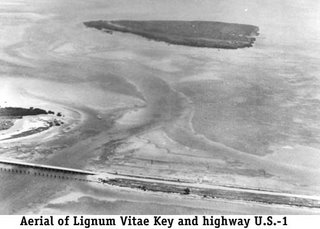

A year ago, I found myself in between symphonies--from my notes on my Key West trip, July, 2005, during Hemingway Days; loosely titled, "Wilting in the Tropics." N.B.: last September I published another excerpt on this blog: "Beam Me Up, Ernie."
MONDAY, JULY 18, 2005
Quarter to eleven already. Gosh darn it, you wouldn’t think I’d awakened at 7. Even with clumps all over the house, ready, set to go, there I was, furtively looking at the clock. I was just about to pack my toiletries next to my casuals and undies, and to plop my dresses on top. Just like a thin layer of meringue on a key lime pie.
Going up the street to Roma’s for a quick café con leche and pastelito de guayaba, I realized, hey, I’m not ready. No perfume, no braided silver and pearl earrings I’d left on top of the bathroom vanity. I felt naked, especially in front of los obreros downing their cortaditos and coladas.
Hell, I felt naked, even in front of myself.
Setting myself aright, I still had to make it to the bank just off Ponce. And then I’d be ready. Perhaps I should have gone to the ATM the day before, when I’d had all the time in the world?
No matter. With an early Cuban merienda in my belly, and cash in my purse, I made it to US 1 at 12:07 p.m. I was finally on my way to The Keys.
In the midst of an unpredictable mid-July day in South Florida, the clouds had gathered, just so. Drizzles fell down, enough to warrant the wipers and lights. Cars were inching down US 1. Oh, boy, I’ll never get there, I fidgeted.
Looking to the right, I saw the tower at The Falls, followed by the turquoise and yellow sign announcing the entrance to Cutler Ridge and Perrine. The clouds had begun to lift, by then.
The farther south I drove, the more hole in the wall Hispanic restaurants I spotted; the faces driving the more and more dilapidated vehicles became more and more ethnic. Migrant territory: beginning to approach Homestead and Florida City.
I’d first spotted the tumbleweeds by the side of the road during my Keys trip in February. Staring at them dumbfounded then, I continued to do so, today. Flat buildings that appeared to have sprung out of nowhere, preceded or followed by these wild grasses.
Or by flat land: by nothing at all. By gnarled trees with bark exposed like gaping wounds.
Andrew. I hadn’t been around in 1992.
I remember speaking with Mami that morning. “A hurricane’s coming,” she’d said. I’d laughed. Later that day, she lost her electricity, but not her phone.
The next day, we’d spoken. “In my almost eighty years, I’ve never heard a sound like this storm,” she’d told me. Boqui, the fifteen-year-old tuxedo cat, had accompanied her by lying, Sphinx-like, on top of the dining room table.
Andrew. I couldn’t look at the pictures of the aftermath then, or now.
No wonder I shuddered at the tumbleweeds, not only in February, but also today.
Continuing down the highway, I also couldn’t help noticing, with both amazement and dread, the increase in the number of markers indicating people who’d died in accidents.
The big Homestead water tower loomed in front of me, to the left. More and more goose bumps shot up and down my spine.
In The Gables I’d barely felt Dennis, and The Keys had, fortuitously, been spared.
But you never know.
A little water began to show by the side of the road. In my driving haze, I’d bypassed Florida City.
I was truly on my way now. Still clinging to my favorite radio channels, I began my long, slow descent to Paradise.
The ride seemed to go at a much faster clip than it had back in February. When the radio frequencies fizzled away into nothingness, I popped in one of my CD’s. Beethoven: I’d very deliberately brought my collection of Beethoven’s symphonies along. Compact discs, packed in their compact box.
Much different from the disparate collection I’d wildly gathered at the last moment on my way out of the house over five months earlier. I’d been desperate, then.
Only a desperate person could listen to Ray Charles’ “Unchain My Heart” blaring forth and sing along, at the top of her lungs, over and over.
This time, it was my childhood favorite, the Pastorale Symphony, which lifted me and enabled me to soar over the Seven Mile Bridge.
I can’t remember the last time my heart leapt so high. Perhaps in February, though, when, with a sidelong glance of recognition, I’d spotted the original Seven Mile Bridge?
The eight or nine year old had come to life. I still can’t find her, all the time, but she’d gone back, back, back…
What was blaring forth then, I wonder. Now that I think of it, we probably didn’t have a working car radio.
I’d just left Marathon behind. For me, Marathon = Milestone. I love the place, with its yokels, dockside eateries, barbecue and cracked conch joints, its consignment shop, its bookstore, its pelicans...and its herons. “Funky chickens,” I call them.
Keeping an eye out for the names of all the Keys, all the channels, is a great road—and time—passer, I’d already discovered. Lignumvitae is my favorite, for all the Latin language loving reasons that anyone could possibly ascribe to me. The thread—or cord—of life: whoever named it knew what matters.
The Keys dangle off the southernmost tip of the Eastern Seaboard just like the stubbornly resistant end of a thread you try to tear off with your teeth or snip off with a blunt pair of scissors. Chances are you might get lucky. Or, then again, you might not.
I was about to begin to learn a thing or two about the Conchs.
With only a pit stop at a McDonald’s on the mainline side of Islamorada, I arrived at the Cow Key Channel Bridge intersection at roughly 4:15 p.m. In a little bit less than four hours, I had reached the city of Key West, my home for the next week.
Not bad.
Driving along as slowly as possible up North Roosevelt, and then Truman, I spotted the At Home In Key West office on the right-hand side of the road. The driver in the car behind me patiently waited for me to pull into the parking lot.
No honking, no beeping, allowed: unheard of, in Miami.
Gathering my keys and insisting that the young woman let me write out my own map, I drove toward the Truman Annex. Crossing Duval at Southard, I told myself, aha, I know this. Frances at Southard in February, now Emma off of Southard.
Not quite. The kindly guard at the Truman Annex gate directed me to the gate down the street. Not Emma, but rather, Thomas.
I found out the next day that Thomas Alva Edison had stayed at the Little White House, when it was the home of the Navy Commandant.
All you have to do is to follow your history around this town.
My car found its spot right under a palm tree top-heavy with coconuts. Two days later, I’d have to move it while lawn maintenance men removed the coconuts. “You wouldn’t want one of them crashing down on your car, now, would you?” The security guard asked me.
That’s when I met the first Papa look-alike, a slightly pot-bellied stunner with killer blue eyes. He’s the co-chair of the contest, and was staying in a unit right across from me. With his son: oh, rats.
My little one-bedroom townhouse unit lived up to its pictures. Cute, quaint, nautical, tropical, modern, campy, all straw and wicker, bright colors…and the largest patio in the row of units, I later noticed.
First, though, I had to check for the air-conditioning control, a phone jack in order to be cyber connected, and coffee filters. Check; check; huh?
The next morning I found out I’d checked all the kitchen cabinets, except for the right one. I had a little trouble finding extra towels, too, at first.
Tired: four firmly focused, fixed hours behind the wheel, after all.
However, not so tired that, after lugging my luggage upstairs—and setting up the computer to my liking—I ventured forth with gusto. My Hemingway Days adventures were about to begin in earnest.
SOME FINAL REFLECTIONS ON LIGNUMVITAE
Back a week tomorrow already. Whew! Still on my Papa high…
On the way back home, I stopped three times: once, in Marathon, to try to make its consignment store my own. Foiled again: closed Mondays. I’ll never learn…
Beethoven’s Ninth had lifted me over the Seven Mile Bridge this time. I’d clumsily been pushing the forward-backward button, aiming to find the right point—just the right point—in the Ode To Joy chorus.
I was so intent on this I neglected to look at all the gorgeously iridescent water that was surrounding me.
So I paid a little more attention while the Fifth boomed out, POM POM POM POM, POM POM POM POM.
Aha! Channel Number Five loomed in front of me. I instantly thought of Chanel Number 5, that classic fragrance I’ll never get tired of from time to time.
Channel Number Five – Chanel Number 5 – Beethoven’s Fifth. How apropos.
I was beginning to fathom that the Pastorale heralded my childhood; the Ninth, possibly my apoplectic highs; and the Fifth, the classic that’s going to surround me for the rest of my life, whether I get tired of it or not. Adulthood.
Between childhood and adulthood, though, comes adolescence. Swerving off the road at the last minute, so much so that both solid and liquid particles of gravel adhered themselves to my car’s sides and tires, I picked up my hot sauces at the key lime products stand in Key Largo. Hot sauces, for a hot rodder, I sheepishly thought to myself.
Back on the road, I calmed down inwardly, and began to listen—to really listen—to the Fifth’s soothing undertones, before Beethoven led me to ride the more subdued crests of HUM HUM HUM HUM HUM HUM HUM HUM HUM. HUM HUM HUM, HUM HUM HUM. Nananananana…
Somewhere just beyond Key Largo, I saw it: Lignumvitae Lane. If I’d blinked, I’d have missed it.
There it was again: the thread of life. I wondered if the person who’d named the channel had also named the lane. Probably. Too much of a coincidence, don’t you think?
This was when I seriously began to think about the stages of life.
The next thing I knew, I’d once again bypassed Florida City, and—after a fashion—Homestead. I didn’t think about Andrew as much this time.
However, with my favorite radio frequencies within reach again, my fingers began to fidget nervously. Will I ever get back?
The tower at The Falls loomed to my left this time, roughly three and a half hours after I’d left Key West. Goose bumps? Nah.
My third stop was in Pinecrest, at one of my favorite yogurt places. This would be lunch, after my “Senior” IHOP breakfast on my way out of Key West that sultry Monday morning. Fairly legitimately trying to shave a few dollars (and some calories) off, the tab had still amounted to over nine dollars. Price Gouging In The Tropics next time, remember?
And then I continued my drive up US 1 and turned left at Le Jeune.
I sincerely hope my lignumvitae continues to be stubbornly resistant for a long time to come.
Sunday, July 31, 2005
My apologies to Ludwig von Beethoven for mangling his notes.
Saturday, July 15, 2006
My Mother Was Right

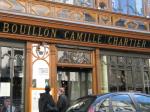
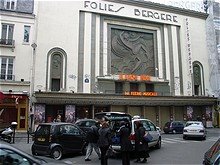
Ooh, to have been seventeen going on fifty-nine...
MY MOTHER WAS RIGHT
BY GEORGINA MARRERO
Tais-toi! Ça suffit!
French. I knew it was French.
I couldn’t understand. I didn’t want to. At fifteen, however, I buckled. Two years of high school French later, my parents sent me to Tours.
Tours. It had to be Tours. That’s where my Hungarian-born mother had gone to study when she was sixteen. That was in 1929.
And in 1931, she’d gone to Paris, where she met my father. They married in 1940. My father took her to Cuba in 1941.
In 1972, she couldn’t request that application for me fast enough.
Landing at Orly in late June, I met her cousin and his wife for the very first time. I’d already met his brother in Toronto. I’d never seen so many Hungarians in one place in my entire Cuban-American life. They’d even had Hungarian restaurants there.
Otherwise, all I knew about Hungarians was that they had a strange language. A language my mother spoke on the phone from time to time in contorted tones, with otherworldly syllables. Even as a child I had deemed it “the language of the moon.”
Be sure to speak only in French, my mother admonished me. What else would I be able to speak with them, I wondered.
And whatever you do, don’t mention the war. And don’t mention the little cousin who had died. Don’t worry, mami, I’d told her.
With all these don’ts under my belt, it’s a wonder I could say anything. In my best French, I gave them a hug.
They said, “Goûte,” as they plied me with platefuls of pâtes, cornichons, and the best bread I’d ever tasted.
They always spoke French, even to each other. I couldn’t resist asking them if they ever spoke Hungarian.
Silence.
They drove me to Tours in their Citroën. I’d been so sure the little tinker toy they’d used to get around Paris was going to fall apart under our very eyes. Mercifully, it didn’t.
The Citroën, though: that was a big deal. More than anything, I was grateful for the legroom.
Settling in at the Cité Universitaire, I became immersed in my course work. Although I shuddered before the daily dictées, the professor seemed to be pleased with my progress.
Classes were in the morning, which left me with plenty of time for languorous lunches and the opportunity to meet fellow students. I made a special effort to also befriend the locals.
My mother was right, though I wouldn’t have admitted it to her then if my life depended on it.
For the Bastille Day celebrations, my relatives drove down in their Citroën to pick me up. All I remember is lying, curled up, sleepily watching fireworks from the back seat. They knew by then I didn’t trust the tinker toy.
French was taking over my life. They were amazed. They wrote my mother a letter about how well I was doing. They were pleased.
She was ecstatic.
At the end of the course, I decided I wanted to travel to Scotland. I called my parents.
Absolutely not, thundered my father. Ana, get over there and see what that girl’s up to. At age fifty-nine, my mother joined me in her Paris.
She showed me everything. She took me to the oldest restaurant: Le Procope; and the cheapest, Le Bouillon Chartier, where a waiter taught me how to eat an artichoke.
I insisted on Au Pied De Cochon. We warily trudged our way there one evening.
My mother was not pleased.
So, of course I had to balk at going to the Folies Bergère. In jeans, I insisted. How about a nice skirt? No.
After all, I was seventeen. I knew it all.
My mother, however, knew her Paris. So she kept trying. She wasn’t telling me anything I hadn’t heard all my life. Except that, this time, we were living it. Together.
At the beauty salon, my mother and her very best friend had a tête a tête. My godparents, who were also in town, wanted to go touring in Spain. What could she do? The peppy little Frenchwoman went on and on.
I’d learned a long time ago that Paris is very popular with Cubans.
And Cubans are very popular with Parisians.
Lucky for us, the Frenchwoman’s husband returned from the road trip early. The three of us went all around Montmartre, and ate some really good food we could all agree on. He helped me choose a pastel-hued artist’s proof that still hangs in my bedroom.
Another journey awaited me upon my return to the States: college. Almost placing out of French, I decided not to major in it.
My mother was not pleased.
When she passed away, I returned to Paris. Scatter her ashes in the Luxembourg Gardens, everyone advised me.
As I wasn’t completely sure, I arrived at Charles De Gaulle without them.
However, I visited her relatives. By then I knew my mother’s family had worn the Star of David on their clothing during the war. My father had been their daughter’s godfather. He knew his prayers in Latin, she said. I was amazed.
I also spent many wonderful hours reminiscing with the Frenchwoman’s widower. He remembered our Montmartre purchase. We made plans to return. Unfortunately, it never happened.
Within ten days, I switched channels: from BBC to LCI. I guess I remembered a thing or two.
My mother was right.
Copyright, 2005 by Georgina Marrero 895 words All rights reserved
